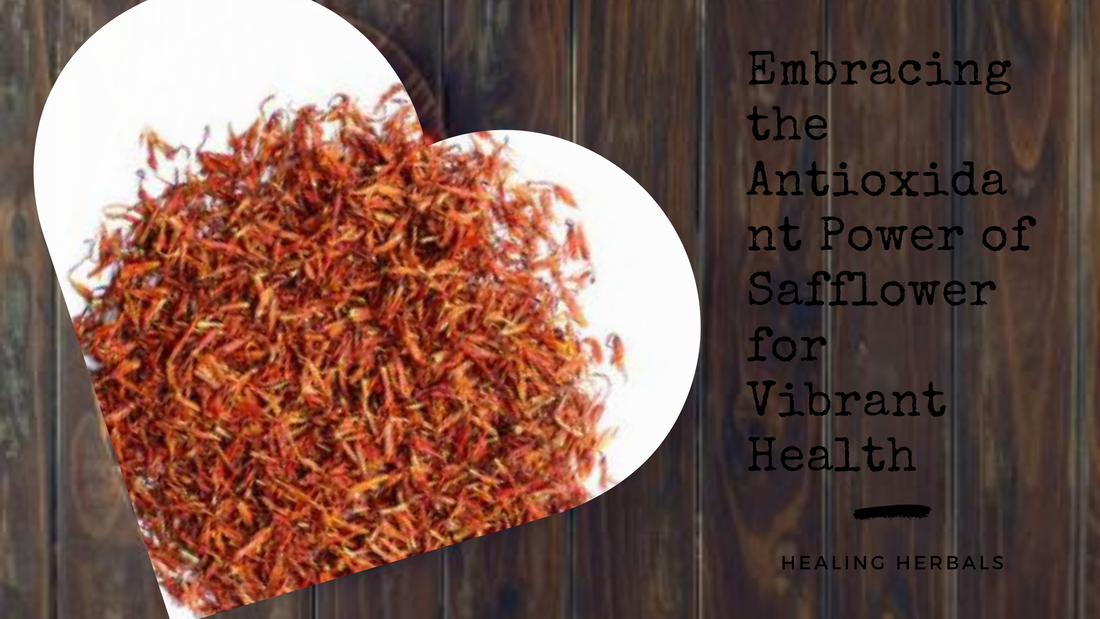
Embracing the Antioxidant Power of Safflower for Vibrant Health
Share
The pretty, though very underutilized, herb safflower has a whole host of benefits in the form of antioxidant properties that can completely turn around your health journey. Imagine exploring nature's armory-very strong antioxidants that combat oxidative stress while boosting vitality. Very much packed with safflower oil nutrition, this unsung hero deserves pride of place in every kitchen for its diverse health properties. Each gold leaf petal is a treasure trove of potential benefits, from improving the shine of the skin to providing cardiac wellness. Do not let this opportunity slip by exploring the numerous benefits that safflower has in store, which may unlock the door to a more resilient, vibrant life.
Understanding Antioxidants
Unsung heroes of cellular defense, antioxidants work tirelessly to minimize the damage inflicted by free radicals highly reactive rogues produced through metabolic processes, pollution, and daily stressors. These compounds are essential for maintaining the integrity of cells, acting like vigilant guardians. Broadly classified into enzymatic antioxidants—produced within the body—and non-enzymatic antioxidants, sourced from various foods, the latter group includes an impressive array of vitamins, minerals, and phytochemicals that fortify the body's defenses.
Safflower: General
Safflower plants can be found in warmer climates, originally occurring in parts of Asia and Africa. They have not been cultivated solely for seed oils but also for their lovely petal flowers, which were employed long ago in traditional dye and medicine. Today, safflower stands as a culinary treasure prized for its subtle flavor and high smoke point, perfect for various cooking techniques. Its history is interlaced with the contemporary kitchen, which highlights its versatility.
Key Antioxidants in Safflower
- Vitamin E: The Power of Tocopherols
Most of the essential antioxidants contained in safflower include vitamin E, specifically tocopherol. The vitamin E is a fat-soluble vitamin known to guard the cell membranes from oxidative damage. In association with other antioxidants, vitamin E increases the body's capability of neutralizing free radicals and increasing the cells' strength.
- Flavonoids: Mother Nature's Shielding Compounds
Safflower is virtually the treasure chest of flavonoids, being widely noted for their diversity. That's a bunch of potent phytonutrients reported for their antioxidant power and activities ranging from an inflammatory inhibitor to anticancer ability. The free-scavenging nature by these flavonoids does prove the cellular protective efficiency associated with well-being due to its inescapability as a health-maintaining ally.
- Phenolic acids
are considered among antioxidants, and one variety could be gallic acids as follows: The second important compound in the antioxidant arsenal of safflower is the phenolic acids, which are very crucial in fighting oxidative stress. These compounds donate electrons to free radicals through their particular molecular structure. This makes them neutralize free radicals. Phenolic acids have a deep influence on the general antioxidant activity of safflower and thus mark it as an herb with health benefits.
Mechanisms of Antioxidant Action
The antioxidant compounds in safflower work through a dynamic synergy to preserve cell integrity. They neutralize free radicals to diminish cellular damage. Such is also necessary in addressing the possible conditions of oxidative stress common factor underlying a majority of chronic diseases. Another thing, the antioxidants from safflower also tend to affect inflammatory pathways thus exerting a variety of functions to promote well-being.
Possible Health Effects of Antioxidants of Safflower
Cardiovascular Support
With high amounts of antioxidants, the benefits of safflower for the cardiovascular system may lie in its protection. These agents in diminishing oxidative stress may improve endothelial function and induce enhanced blood flow, being a critical factor for healthy heart functioning.
Skin Improvement
Safflower's antioxidants are a healthy armor for the skin, guarding it from oxidative damage by environmental aggressors. They help keep the skin elastic and can fight early aging, so the complexion appears younger and brighter.
Boosting Immunity
Including antioxidants from safflower in the diet may also enhance immunity. This could be attained through enhancing immunity and inhibiting oxidative stress, thus boosting the body's capacity to fight infections and diseases as a whole.
Control of Blood Sugar
Some preliminary studies of safflower antioxidants were shown to help maintain healthier blood sugar levels. Research is still required, though the potential of safflower in helping glucose metabolism and the study behind it present an interesting topic.
Introducing safflower oil nutrition into cooking and culinary practices is easy and delightful. The oil has a mild flavor and is excellent for sautéing, frying, or as a base for salad dressings. Petals add color and flavor to dishes. For those who have an interest in supplementation, safflower oil comes in capsule form thus easily adding it to diets.
Conclusion
The antioxidant properties offered by safflower provide quite an exciting avenue for better nutrition and health. Being incredibly rich in vitamin E along with flavonoids, phenolic acids, etc., safflower comes forth as a very shining example of nature's storehouse. As more people become interested in upgrading diets to achieve better health indices, safflower surely offers a strong contender - a candidate that must indeed be explored and valued for all its worth.safflower oil is available in capsule form, offering a convenient option for enhancing dietary intake.
Safflower from Healing Herbals:




